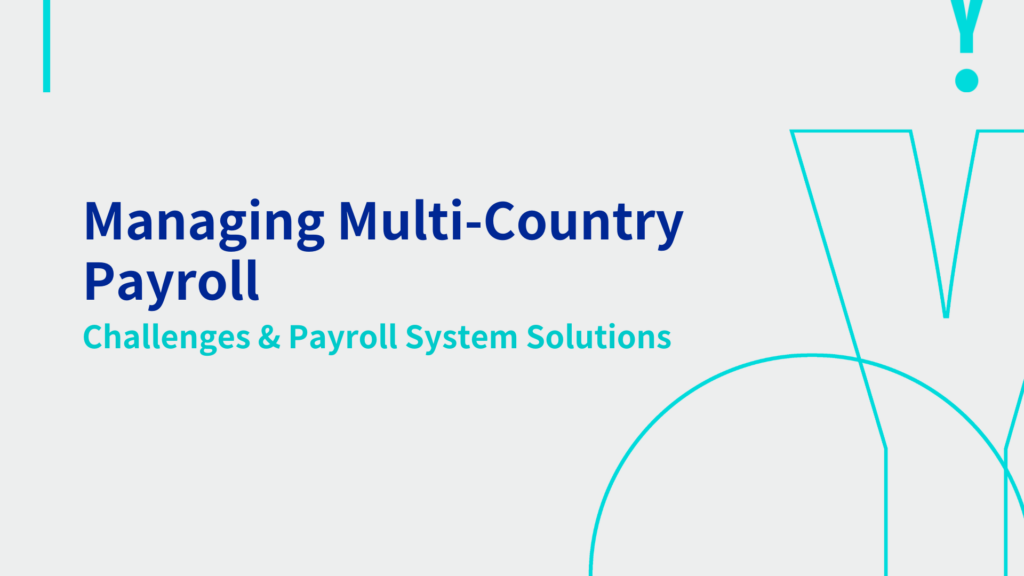
Global expansion brings endless opportunities, but managing payroll across multiple countries can quickly become a daunting challenge for businesses. Different countries impose unique tax structures, labor laws, and compliance requirements, creating complexities that often overwhelm even established organizations.
Additionally, managing diverse currencies, exchange rates, and employee benefits further complicates payroll accuracy. When mistakes happen, they affect employee satisfaction and company reputation. However, technology now offers smart solutions, and that can be opted for through the best payroll system.
Payroll management platforms and automation tools reduce errors, streamline processes, and enhance compliance efficiency. Businesses adopting modern payroll software can simplify reporting, unify payroll structures, and ensure timely employee payments across borders. Moreover, centralized platforms create transparency while reducing manual tasks.
This blog explores the key challenges businesses face with multi-country payroll and highlights effective technology-driven solutions. With the right approach, businesses can transform payroll management into a seamless, compliant, and efficient process that supports sustainable global growth.
- The Growing Complexity of Multi-Country Payroll
- Regulatory Diversity across Borders
- Currency And Exchange Rate Management
- Employee Benefits & Local Practices
- Key Challenges Businesses Face in Multi-Country Payroll
- How Does Technology Simplify Multi-Country Payroll?
- The Role of Analytics in Global Payroll System Management
- Benefits of Adopting Technology-Driven Payroll Management
- Best Practices for Managing Multi-Country Payroll
- Future of Multi-Country Payroll:
- End Note
The Growing Complexity of Multi-Country Payroll
Managing payroll in one country is challenging, but handling it across multiple nations adds significantly more complexity. Every jurisdiction enforces unique rules, requiring consistent monitoring and adaptation.
Regulatory Diversity across Borders
Each country imposes its labor laws, minimum wage requirements, and tax structures. Businesses must comply with varying employment contracts, overtime regulations, and pension schemes.
Additionally, failure to comply with these regulations can result in costly penalties. Moreover, regulatory updates demand businesses constantly update payroll processes.
Currency And Exchange Rate Management
Global payroll involves multiple currencies. Exchange rate fluctuations impact accurate salary disbursements. Mismanagement of conversions can cause financial discrepancies, employee dissatisfaction, and compliance risks.
Therefore, organizations must maintain strong systems for real-time currency monitoring. Reliable technology can help manage this challenge effectively. Hence, consider the best HR Hong Kong for your offices.
Employee Benefits & Local Practices
Different regions prioritize unique benefits such as healthcare, allowances, or retirement plans. Companies must align payroll with local expectations.
However, overlooking these benefits may reduce employee satisfaction. Consequently, businesses must balance global consistency with localized customization.
Key Challenges Businesses Face in Multi-Country Payroll
Despite adopting standard policies, several challenges persist across industries. These challenges often limit payroll efficiency and create operational risks.
Data Fragmentation
Many businesses operate in silos where payroll data is stored across multiple systems. This fragmentation creates inefficiencies and also reduces data accuracy.
Manual reconciliation of fragmented data consumes time and resources. Additionally, inconsistent data handling can cause payroll errors and compliance failures.
Compliance Risks
Regulatory non-compliance remains the most significant risk in global payroll. Governments impose frequent updates on tax laws, statutory contributions, and reporting requirements.
Consequently, organizations without real-time compliance tools face legal penalties, audits, or reputational damage. Thus, compliance must be prioritized.
Scalability Issues
As companies expand globally, their workforce grows in size and diversity. Traditional payroll methods struggle to scale with increasing demands.
Therefore, outdated payroll management systems create bottlenecks, errors, and inefficiencies. Businesses need scalable platforms to accommodate workforce expansion seamlessly. Here, YOOV can help you.
How Does Technology Simplify Multi-Country Payroll?
Thankfully, modern technology in payroll systems offers comprehensive solutions for these challenges. Payroll software, automation tools, and cloud-based systems transform complex processes into streamlined operations.
Cloud-Based Payroll Platforms
Cloud platforms centralize payroll data, creating a single source of truth. Businesses can manage multiple countries’ payroll processes from one platform.
This centralization improves efficiency, ensures data security, and simplifies compliance monitoring. Additionally, cloud systems provide real-time access to payroll reports for leadership teams.
Automation of Payroll Processes
Automation reduces manual errors by automatically calculating wages, deductions, and benefits. Moreover, automation ensures accuracy across multiple jurisdictions. It also reduces administrative workload for HR teams. As a result, payroll teams can focus on strategy rather than repetitive tasks.
Integration with Compliance Tools
Modern payroll platforms integrate with compliance monitoring systems. These integrations ensure organizations stay aligned with changing laws and regulations.
Real-time alerts notify teams about tax reforms, statutory changes, and reporting deadlines. Therefore, businesses minimize risks and maintain trust.
Currency And Payment Solutions
Payroll platforms now support multi-currency payments with built-in exchange rate management. Employees receive timely, accurate payments regardless of location. Hence, it eliminates conversion errors and improves employee satisfaction. Furthermore, businesses gain greater financial control through consolidated currency management.
The Role of Analytics in Global Payroll System Management
Beyond efficiency, analytics provides deep insights into payroll performance. With our HR Hong Kong software, businesses can identify trends, risks, and opportunities using advanced reporting tools.
- Workforce Cost Analysis
Analytics helps businesses evaluate workforce expenses across different countries. Decision-makers can compare costs and allocate budgets more effectively. So, this visibility allows companies to plan expansions strategically. It also improves financial forecasting for sustainable global operations.
- Compliance Tracking
Analytics enables proactive compliance monitoring. Reports highlight potential risks before they escalate into penalties or audits. Consequently, organizations can address issues immediately. This proactive approach builds confidence in payroll software systems.
Benefits of Adopting Technology-Driven Payroll Management
Investing in payroll technology delivers significant advantages for globally expanding businesses. These benefits extend beyond operational efficiency.
Improved Employee Experience
Accurate and timely salary payments build trust and employee satisfaction. Transparent reporting ensures employees clearly understand benefits and deductions.
Furthermore, technology-driven systems offer self-service portals for employees. These empower staff to access payslips, tax documents, and benefit statements independently.
Greater Transparency And Control
Businesses gain real-time visibility into payroll data. Centralized dashboards present a clear view of payroll costs, compliance status, and employee distribution. This transparency supports informed decision-making and enhances trust between HR teams, management, and employees.
Cost Efficiency
Automated payroll reduces manual labor, cutting administrative costs significantly. Moreover, an accurate payroll system eliminates penalties from compliance failures, creating long-term savings. In addition, businesses can scale operations without drastically increasing payroll headcount, enhancing operational efficiency.
Best Practices for Managing Multi-Country Payroll
To maximize efficiency, businesses should adopt proven practices alongside technology.
- Centralize Payroll Operations
Creating a unified payroll strategy helps standardize processes. Centralized systems ensure global consistency while maintaining flexibility for local customization.
- Partner with Payroll Experts
Collaborating with payroll service providers or consultants provides expertise. Professionals guide businesses through compliance, taxation, and process optimization. So, visit us and know how we can help you.
- Regularly Audit Payroll Processes
Frequent payroll audits ensure data accuracy and compliance alignment. Audits identify errors, reduce risks, and maintain financial integrity.
- Invest in Employee Training
HR and payroll staff must be trained to use modern payroll platforms effectively. Knowledgeable teams minimize risks and enhance system efficiency.
Future of Multi-Country Payroll:
The future of payroll management will rely heavily on innovation. Artificial intelligence, blockchain, and predictive analytics will drive payroll transformation. AI will automate decision-making and detect irregularities.
Therefore, businesses must embrace innovation today to prepare for tomorrow’s global workforce challenges.
End Note
Managing a multi-country payroll system requires careful planning, compliance awareness, and technology-driven solutions. Without the right systems, global expansion risks financial losses and inefficiencies.
However, businesses investing in cloud platforms, automation, and analytics can simplify payroll, improve compliance, and enhance employee trust. Ultimately, payroll management is not just about paying employees. It is about creating consistency, transparency, and efficiency across borders.
Therefore, by adopting innovative payroll technologies, businesses can transform payroll into a strategic advantage, supporting sustainable global expansion and long-term success. So, if you want to manage your business and offices across countries, consult with our experts at YOOV.
Connect with YOOV

WhatsApp:Click Here
Email:hello@yoov.com
Website:https://www.yoov.com/